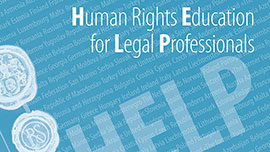Speech by Tatiana Termacic
Regional Conference “Professional Training of judges and prosecutors: The Council of Europe’s approach”
Minsk, 28-29 April 2016
Ladies and Gentlemen,
A well-trained judge or prosecutor will perform his/her duties with more confidence and his/her decision is likely to be better accepted because there will be trust that it is reasoned on the basis of legality, respect for rule of law and human rights. This is why professional training is so important. Because law, be it national or international, evolves, this is not a one-off event but rather an uninterrupted journey from school, university throughout the professional career.
One can compare professional training for legal professionals to on-the-job training for a pilot: he/she has to ensure that the plane takes off, flies and lands safely. A judge or a prosecutor has to ensure that human rights are effectively protected and implemented at national level.
Because the actors of the justice chain have a fundamental role to play in the respect of rule of law and protection of human rights, they should not limit themselves to abstract knowledge, they should focus on how to apply it in concrete situations. Education means acquiring: skills, knowledge and values. The aim is not for each judge or prosecutor to become an expert in human rights, it is rather to develop a reflex that a criminal, civil or administrative case might have a human rights dimension.
Many human rights are embedded in national law. In addition, international instruments, such as the ECHR and the UN Covenant for Civil and Political Rights and their respective case law, are also sources with which legal professionals should be familiar.
Certainly, European judges, lawyers and prosecutors do use convention-based arguments in their judgments, submissions and decisions. However, it is also clear that, in far too many situations, the Convention and the case law of the Strasbourg Court have not been taken into consideration in situations to which they were clearly relevant. This is for example the case regarding the lack of effective investigations of allegations of ill-treatment and the lack of scrutiny of prosecutors’ decisions on pre-trial detention, as well as in cases of excessive length of pre-trial detention.
This is because for many national judges and prosecutors, the task of applying the case law of the Strasbourg Court can appear overwhelming because the principles of interpretation might seem alien to some national legal traditions. This appearance can also discourage lawyers from using Convention-based arguments in their submissions.
This is why the provision of professional training on Convention standards and the translation and dissemination of the case law of the Strasbourg Court are essential. Without them, it would be very hard to ensure that proper account of the Convention and its case law is taken in the deliberations and decision-making of national courts.
Several Council of Europe and UN documents provide a useful rationale for this life-long education journey.
Opinion 4 (2003) of the Consultative Council of European Judges on appropriate initial and in-service training for judges at national and European levels: it is essential that judges, selected after having done full legal studies, receive detailed, in-depth, diversified training so that they are able to perform their duties satisfactorily. The trust citizens place in the judicial system will be strengthened if judges have in-depth and diverse knowledge which extend beyond the technical field of law. Training is essential for the objective, impartial and competent performance of judicial functions, and to protect judges from inappropriate influences.
CCJE Opinion 9 (2006) on the role of national judges in ensuring the application of international and European law. Aim: “to achieve a sound application of international and European law, particularly human rights law. The training of judges, availability of relevant information and documentation as well as translation and interpretation are means to reach this goal”. The CCJE underlined that national judges are the guarantors of the respect and proper implementation of international and European treaties to which the state they belong to is a party, including the ECHR.
CM Rec (2004)4, on the ECHR in university education and professional training. Aim: human rights should be incorporated in the curriculum of stable training structures, the Convention and its case law should be part of the common core curriculum of law, political and administrative science, a component of the preparation programmes of examinations for access to the legal professions and of the initial and continuous education for judges, prosecutors and lawyers, law enforcement bodies and personnel of immigration services. It will be updated in 2016-2017 to take into account new developments, including the use of new technologies.
This recommendation is actually the birth certificate of the European Programme for Human Rights Education for Legal Professionals (HELP), which aim is precisely to ensure that human rights training throughout the European space is of good quality and meets the specific needs of each category, be it judges, prosecutors or lawyers.
HELP has become the platform for all human rights capacity development endeavours undertaken by the Council of Europe. Its relevance has been reaffirmed by the 47 member states in the Brussels Declaration’s action plan, which recalls the shared responsibility between them and the Council of Europe in protecting human rights at the national level.
The UN has also developed a detailed strategy for an Era of application of International Law together with an action plan to make sure that national law is implemented in a coherent and harmonized manner with international law.
Ladies and gentlemen,
Allow me to say few words about the response the Council of Europe has been providing to its member states to ensure adequate training on human rights and rule of law standards at national level.
The Organisation has been providing training on the Convention in a number of its member states for nearly two decades. Indeed, for a long time, in some countries, the only training provided on the Convention was that which was undertaken by the Council of Europe. Fortunately, this situation now belongs truly to the past and each member state has a stable national training institution entrusted with the training of its country's judges and prosecutors. Some of these national training institutions were established with the assistance of the Council of Europe.
Such support was not sufficient to provide long-term impact so the HELP Programme was created, to accompany legal professionals throughout their journey.
You already heard from Philippe Boillat that it is a Network of judicial training institutions and bar associations from all 47 member states, actually the only genuine PAN-European Programme of legal education.
What is interesting with HELP is that it does not replace national training institutions but ensures that high quality training is delivered by them. It, therefore, builds a strong national ownership by enhancing the capacity of national trainers through “training-the-trainers” on the HELP methodology and content as well.
Its tailor-made approach means that it adapts its training tools to the respective national legal systems: the ECHR perspective is integrated into national law so that it is not perceived as something alien.
Also, HELP national webpages are created, where all relevant information and developments on human rights training will be published by a national HELP Focal Points (judges – prosecutors) and HELP Info Points (BAs).
HELP also adapts to the workload of legal professionals by proposing its training tools on an e-learning platform on the basis of open education. The principle of open education gives legal professionals the opportunity to learn about what they want to learn, when they want, by giving them the sense of responsibility for their education and easy access to self-learning materials. The idea is to develop a new way of thinking and working, not to impose any particular view. All in all, HELP is adapted to all needs through the use of modern technologies.
Later today, my colleague Natacha De Roeck will present you three courses and the method by which they were developed. What is interesting to point out is the broad variety of available courses: anti-discrimination, alternatives to detention, admissibility of evidence, transitional justice, property rights, etc. New courses are prepared as a response to societal challenges faced by Europe: the HELP/UNHCR course on asylum has contributed to ensure quality in the asylum decision-making and has been a concrete way in which the Council of Europe supported its member states in the refugee crisis. The course on anti-trafficking that is being developed is also relevant beyond Council of Europe member states, since Belarus is a member of GRETA.
It is also important to underline HELP’s contribution to a harmonised case law at the national level. Indeed its’ tools help judges and prosecutors from different courts to have a coherent approach when interpreting and implementing human rights standards. This is particularly important because a coherent and harmonised interpretation between different courts will also lead to legal certainty. The course on legal reasoning that will be developed this year will be a useful tool for that purpose.
Ladies and Gentlemen,
Ultimately, good quality training should generate domestic decisions that reflect international standards such as the case law of the ECtHR or UN decisions. However, there are often persistent patterns of non-compliant judgments which clearly indicate a gap between “good” training and “bad” decisions”. The reasons are multiple: undue pressure from the authorities, influence of public opinion, an entrenched culture within the judiciary of giving priority to the protection of the state over the protection of human rights, bias against the members of certain social groups, peer pressure from other judges, linguistic barriers and lack of updates in the context of a constantly evolving case law. The earlier in life human rights education starts, the earlier these obstacles will be removed.
In conclusion, only a well-educated judge may be truly independent and thus prevent human rights violations at national level. This was confirmed last week in Sofia, where ministers of Justice of the 47 member states endorsed the new 2016 – 2021 Council of Europe action plan on strengthening judicial independence and impartiality. Undoubtedly, the same reasoning applies to non-member states.




